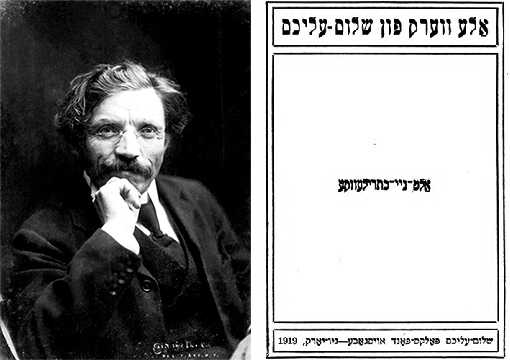37 Yiddish

דער גרויסער וועלט-פּראָגרעס האָט זיך אַהין אַרייַנגעכאַפט און האָט איבערגעדרייט די שטאָט מיטן קאַָפּ אַראָפּ, מיט די פֿיס אַרויף.
The great progress of the world has reached Kasrilevke and turned it topsy-turvy.
– From narrator’s foreword to the Kasrilevke stories (1919)
אַיין אַיינשרומפּעניש! ווען האָט געקאָנט ארויס דער צאַפּען, אַיינגעזונקען זאָל ער ווערען? … אַ, ברענען זאָלסט דו, שלים־מזל, אויפ’ן פייער!
און גרונם … דערלאַנגט דעם אַ רוק מיט’ן בייטש־שטעקעל אין זייט אַריין. דאָס פערדעל טהוט אַ פּינטעל מיט די אויגען, לאָזט־אַראָפּ די מאָרדע, קוקט אָן אַ זייט און טראַכט זיךְ׃ פאַר וואָס קומט מיר, אַשטייגער, אָט דער זעץ? גלאַט גענומען און געבוכעט זיךְ! ס’איז ניט קיין קונץ נעמען אַ פערד, אַ שטומע צונג, און שלאָגען איהם אומזיסט און אומנישט!
The driver of the wagon with the water barrel was beside himself! “An empty barrel! … May my helper shrivel up! How could that plug, may it sink into the earth, have come out? May you burn up, wretch that you are!” The last remark was addressed to the little horse, as he struck it with the whip handle. The horse blinked, lowered its chin, and looked aside, thinking, “What have I done to deserve this whack? It’s no trick, you know, to hit a dumb animal for no reason whatsoever.”
– From the story “Fires”
Yiddish is the thousand-year-old language of European (Ashkenazic) Jews. Written from right to left in Hebrew characters, it is derived from German and includes many Hebraic and Slavic elements. It is used for everyday purposes as well as for a rich variety of religious and secular literature, ranging from medieval times to the 21st century. Most Yiddish users were annihilated during the Holocaust of World War II, yet the language continues to thrive in the United States, Israel, and Europe.
Arguably the best-known Yiddish writer, Sholem Aleichem (Sholem Rabinovich, Ukraine 1859 – United States 1916) was a founding father of modern Yiddish literature. A supreme humorist, he created the literary persona of “Sholem Aleichem” and tapped into the energies of the Eastern European spoken Yiddish idiom. In a variety of genres, he invented modern Jewish archetypes, myths, and fables of unique imaginative power and universal appeal. Sholem Aleichem’s “Tevye” stories provided the basis of the popular mid-20th century musical Fiddler on the Roof. He founded the Folks-bibliotek publishing house (Kiev, 1888) to encourage writers he admired, and identify new talent. In his satirical, yet warm Kasrilevke stories of the 1900s, he created the quintessential fictional shtetl. Its poverty-stricken residents aspired to modernity. Though plagued by backwardness, they continued to dream of redemption.
Following the death in 1916 of the beloved Sholem Aleichem, multi-volume editions of his collected works were published widely. This 1919 edition is printed in the Yiddish spelling prevalent at the time, with transliterations of Germanic linguistic elements; this was meant to help “legitimize” Yiddish (then considered a “jargon”). These transliterations are not used in modern standardized Yiddish orthography. The story “Fires,” from which this selection is taken, underlines the actual lack of progress in the fictional town of Kasrilevke, which prides itself on striving for modernity. The aside, giving voice to the abused horse in the midst of this municipal crisis, is typical of the creative yet plainspoken genius which made Sholem Aleichem so popular.
While the number of native speakers of Yiddish continues to dwindle, Yiddish at Berkeley is thriving. In addition to the esteemed annual conference on Yiddish Culture, we have a wide range of courses dealing with the life and culture of Ashkenazic Jewry, a diverse faculty committed to the preservation and scholarly investigation of Yiddish, and an ever-growing number of students who are pursuing academic futures exploring Jewish culture in the traditional languages of the Jewish people. Students interested in Yiddish at Cal can pursue their interests in the departments of German, Comparative Literature, History, or through the program in Jewish Studies.
Contribution by Yael Chaver
Lecturer in Yiddish, Department of German
Title in English: Old-New Kasrilevke
Author: Sholem Aleichem, 1859-1916
Imprint: Nyu-Yorḳ : Shalom-ʻAlekhem folḳs-fond, 1919.
Edition: in Ale Verk, Sholom Aleichem
Language: Yiddish
Language Family: Indo-European, Germanic
Source: The Internet Archive (Yiddish Book Center)
URL: https://archive.org/stream/nybc200084
Select print editions at Berkeley:
- Sholem, Aleichem. Alṭ-nay-kas̀rileṿḳe. Nyu-Yorḳ: Shalom-ʻAlekhem folḳs-fond, 1919.

